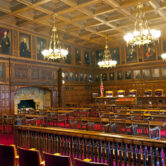(CN) --- A federal judge erred when he blocked Arizona county recorders from throwing out unsigned ballots at the end of Election Day, attorneys for the state and the Republican Party told a three-judge Ninth Circuit panel Wednesday.
“Arizona, like three other states, allows curing until polls close,” said Drew Ensign of the Arizona Attorney General’s Office, referring to the process of verifying ballot signatures. “That is an eminently reasonable practice and more generous than a majority of states.”
The appeal stems from a June 2020 lawsuit in which the Arizona Democratic Party, Democratic Senatorial Campaign Committee and Democratic National Committee asked the court for a permanent injunction to stop the state from throwing out the ballots.
The plaintiffs eventually won the case against Arizona Secretary of State Katie Hobbs and the 15 county recorders. Donald J. Trump for President Inc., the Arizona Republican Party, and the Republican National Committee joined as defendants.
Arizona voters can use mail ballots for any reason in any election, and most do. In the 2020 presidential election, about 70% of voters used absentee ballots, though many voters dropped them off at polls. Ballots with signatures that don’t match signatures on file are set aside and attempts are made to “cure” them, or confirm that the ballots are valid. The deadline is five days after the election.
But ballots with no signatures are tossed if they aren’t cured by 7 p.m. on Election Day. Claiming the restriction disenfranchises thousands of voters, the plaintiffs are asking for five days after Election Day to cure unsigned ballots.
In a letter to the court last week, the state of Arizona, an intervenor appellant, reiterated its position that the state voting system, which includes wide access to mailed ballots and three weeks of early in-person voting, as well as Election Day polling places, inherently protect voting rights. In the context of this system, tossing unsigned ballots is not an undue burden on anyone, the state argued.
U.S. Circuit Judge A. Wallace Tashima questioned whether the state should treat these ballots differently from other ballots with mistakes, such as mismatched signatures. Yes, Ensign said.
“With signature mismatches, it typically isn’t the fault of the voter whatsoever, in contrast to a missing signature, which is entirely the fault of the voter,” he said.
Daniel Shapiro, representing the Republican National Committee and Arizona Republican Party, argued that allowing the state to cure ballots after Election Day is illegal.
“Unsigned ballots are incomplete and invalid. Mismatched ballots have long been seen in Arizona to be complete but invalid,” Shapiro told the judges. “Signing an unsigned ballot after Election Day is in effect voting after Election Day, and there is no right to do that, and preventing that doesn’t impose any kind of burden on plaintiffs.”
U.S. Circuit Judge Susan P. Graber asked plaintiffs’ attorney Elisabeth Frost of Perkins Coie in Washington whether the burden the law imposes on voters is minimal or undue. It doesn’t matter, Frost said, because even if it were a minimal burden, the state would have to prove the law reasonably advances its goals, which it hasn’t.
“Even if it is a minimal burden, we still win,” she said.
Graber then pointed out that many ballot mistakes can’t be cured after Election Day, such as accidentally voting for the wrong candidate. At what point is it reasonable to cut off the cure period, she mused.
“That point may be the end of the voting period,” Graber said.
The state also argued that the process of curing unsigned ballots would use state time and resources that could be better used fighting potential fraud. But Frost said no county recorder has signaled a burden from curing and counting the ballots, which the counties would already be doing for mismatched ballots.
“We’re saying just give them the same opportunity to correct these ballots,” she told the judges.
Tashima and Graber are both Bill Clinton nominees. Senior U.S. District Judge Kathyn Hoefer Vratil, a George H.W. Bush nominee sitting by designation from the District of Kansas, rounded out the panel. The judges gave no indication of when they might rule.
Subscribe to Closing Arguments
Sign up for new weekly newsletter Closing Arguments to get the latest about ongoing trials, major litigation and hot cases and rulings in courthouses around the U.S. and the world.









